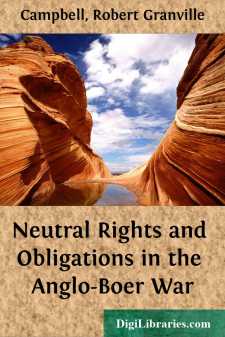Categories
- Antiques & Collectibles 13
- Architecture 36
- Art 48
- Bibles 22
- Biography & Autobiography 813
- Body, Mind & Spirit 142
- Business & Economics 28
- Children's Books 15
- Children's Fiction 12
- Computers 4
- Cooking 94
- Crafts & Hobbies 4
- Drama 346
- Education 46
- Family & Relationships 57
- Fiction 11828
- Games 19
- Gardening 17
- Health & Fitness 34
- History 1377
- House & Home 1
- Humor 147
- Juvenile Fiction 1873
- Juvenile Nonfiction 202
- Language Arts & Disciplines 88
- Law 16
- Literary Collections 686
- Literary Criticism 179
- Mathematics 13
- Medical 41
- Music 40
- Nature 179
- Non-Classifiable 1768
- Performing Arts 7
- Periodicals 1453
- Philosophy 64
- Photography 2
- Poetry 896
- Political Science 203
- Psychology 42
- Reference 154
- Religion 513
- Science 126
- Self-Help 84
- Social Science 81
- Sports & Recreation 34
- Study Aids 3
- Technology & Engineering 59
- Transportation 23
- Travel 463
- True Crime 29
Neutral Rights and Obligations in the Anglo-Boer War
Description:
Excerpt
CHAPTER I.
THE NEUTRALITY OF THE UNITED STATES.
The neutral attitude assumed by the United States was maintained throughout the war. With reference to any official recognition of the Transvaal as an independent State apart from the immediate purposes of war no action was taken. This view of the situation in South Africa was entirely consistent with the requirements of international law, and, in carrying out the obligations of a neutral to the belligerents, the governmental position was fully justified by a knowledge of the relations which had existed between the Transvaal and Great Britain in the past.
Early in October, before war had actually begun, it was understood that Mr. Pierce, the Orange Free State consul-general in New York, had made every effort to induce President McKinley to request other nations to act with the United States as arbitrators in the dispute between the Governments of the Transvaal and Great Britain, but the close friendship existing between England and the United States and the very friendly attitude assumed by Great Britain during the Spanish-American War made such action impossible. The State Department at Washington announced that in the event of war the Government would maintain an absolutely neutral attitude, and issued instructions early in October to all American consuls in South Africa directing them to secure protection for all neutrals of the United States who had not affiliated politically with either Great Britain or the South African Republics, either by exercising the franchise or otherwise. While those whom this definition did not cover were not to be directly under the protection of the United States, the State Department expressed itself as ready to use its good offices in their behalf in case they were involved in trouble resulting from the war. Such had been the position of the Department in the case of Mr. John Hays Hammond, a citizen of the United States who had been involved in the Jameson Raid, although he had taken part in an expedition which was not officially approved by Great Britain and which was hostile to a Government with which the United States had no quarrel.[1]
[Footnote 1: For. Rel., 1896, pp. 562-581.]
On October 8, the day before the Transvaal ultimatum was presented to Great Britain, the British Ambassador in Washington confidentially inquired whether in the event of an attack upon the English forces by the Boers, rendering necessary the withdrawal of the British agent, the United States would allow its consul to take charge of the British interests in the Transvaal.[2] Consent was very properly given on the eleventh that the United States would gladly allow its consul at Pretoria "to afford to British interests in that quarter friendly and neutral protective offices."[3] On the thirteenth this courtesy was acknowledged and the information given that the British agent had withdrawn. On the same day Mr. McCrum was instructed, "with the assent of the South African Republic, to afford to British interests the friendly protective offices usual in such contingencies."[4]
[Footnote 2: For....


